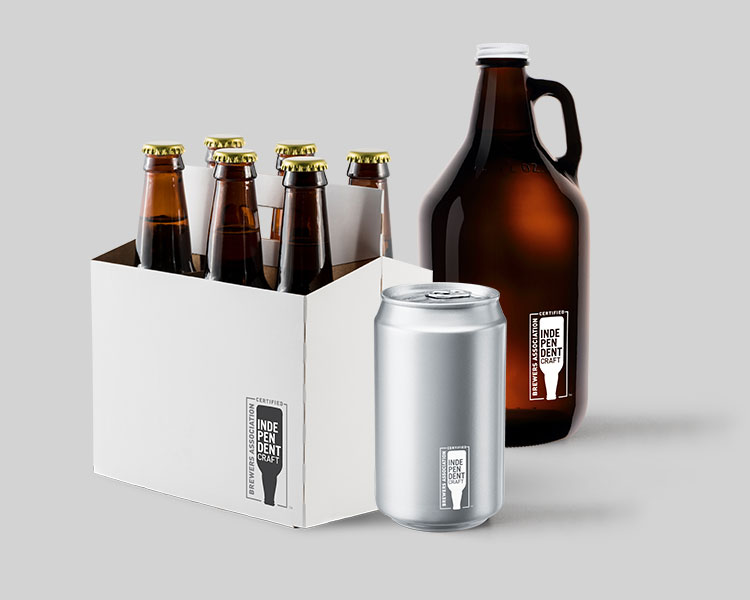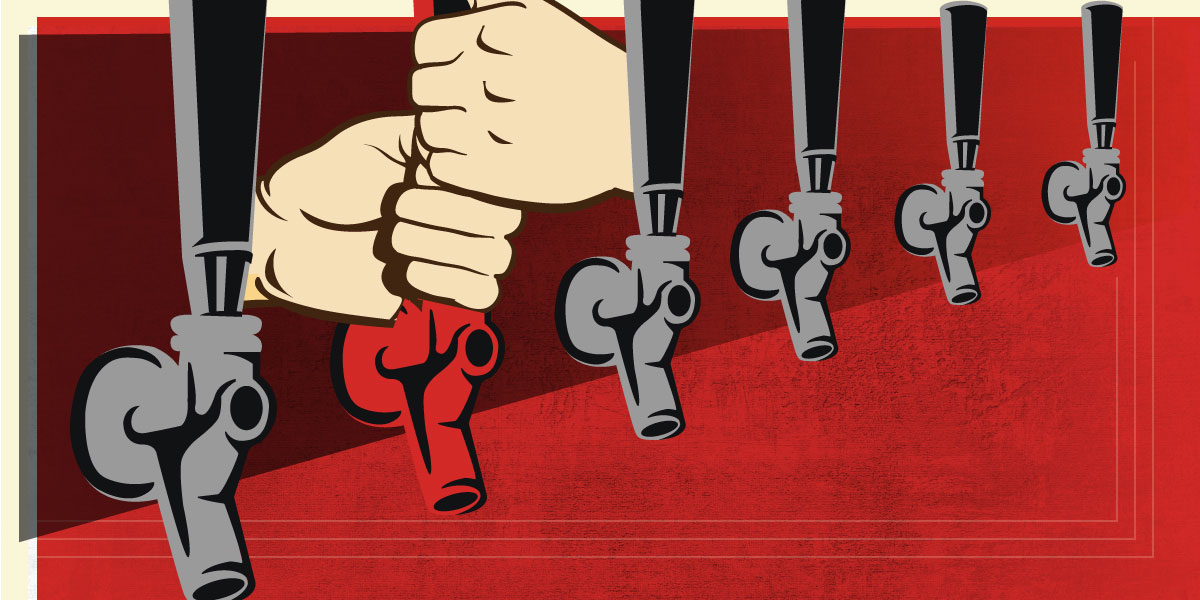It’s a narrative that could have been lifted from the pages of a Soviet-era spy novel, complete with misinformation, collusion, embedded cells and double agents. It would make for one hell of a story if it wasn’t a reality in the world of beer.
A quarter-century after the end of the Cold War, Soviet tactics are alive and well in a new clash of world powers: Anheuser-Busch InBev and the collective resolve of small and independent craft brewers. We are in the midst of a Cold War in American beer. The fate of beer as we know it hangs in the balance and years of keeping up uneasy appearances as tension builds under the surface works to make that balance teeter.
(VISIT: Find a U.S. Brewery)
The Stakes
I know the comparison between craft beer and Bolsheviks is melodramatic, but the prospects of a grim beer existence dominated by a leviathan is a clear threat. Warfare has evolved and is taking on civilian casualties, encouraging apathy among consumers and promoting the “Illusion of Choice.”
The “Illusion of Choice” is the name for Big Beer’s fleecing of American beer consumers by leveraging their power to get retailers to serve beer offerings that look diverse but are actually all from breweries that have been acquired by Big Beer. The consumer believes that they have a choice, but in reality, any “choice” goes to support one company. Clandestine cells of actors – in this case, category captains for big beer wholesalers — work in plain sight to ensure this illusion is delivered seamlessly to an unsuspecting beer public. You’ll see the signs the next time you’re shopping for beer. Look closer at cooler and store shelves. Which beer choices are eye-level and front-and-center? When you’re at a restaurant, which beers are most visible on menus? Beer selection should be based on the preference of the beer drinker, not pushed on the public. It’s a battle for territory and occupying territory. They work on the “inside” but are taking orders from the Motherland.

In an effort to fight back, the Brewers Association (BA), publishers of CraftBeer.com, embarked on an awareness campaign to highlight the Illusion of Choice, call for transparency in the marketplace and champion independent craft brewers and the beers they produce. In June, the Brewers Association released the independent craft brewer seal, a silhouette of an upside-down bottle symbolic of small and independent craft brewers’ role in turning the beer industry on its head. The intent of the seal is to give you, the consumer, a visual way to recognize beers from small and independent craft brewers when they’re sitting on a shelf next to beers from breweries owned by Big Beer. The independent seal goes a long way in helping you see who makes the beer you buy.
Many have remarked about AB InBev’s response to this awareness campaign being largely quiet, but that is misleading. The mega-corporation has pulled several pages from the Soviet propaganda playbook to muddy the intent of these efforts. If you think embedded cells, state-run media and Whataboutery is for Cold War history books, think again.
(LEARN: CraftBeer.com’s Big List of Beer Schools)
The Iron Curtain
Whataboutery or Whataboutism is a tactic the Soviets used to attempt to discredit an opponent’s position by charging them with hypocrisy without directly refuting or disproving their argument. The tactic has had a resurgence in contemporary politics; it is also a pretty common divisive tactic on social media.
Like the Soviets, AB used Whataboutism in their response video to the independent craft seal by offering other priorities craft brewers should be focusing on instead of independence. Parts of the script read: “We’re all beer, and we’re fighting this bigger battle which is wine and spirits … and we’re losing margin … There are clear threats from wine and spirits … as well as getting back to quality.”
Quality and competition from substitute goods are absolutely legitimate concerns for an industry, but the “threat” of wine and spirits and a call to focus on quality were points that were weaponized. Big Beer’s response was an attempt to distract and divide.
(INFOGRAPHIC: How to Choose the Right Beer Glass)
AB InBev’s strategy has gone far beyond Whataboutery by key individuals. 2017 was marked by further revelations of AB’s infiltration of beer media, and even beer rating sites, to highlight the lengths the company will go to further push the Illusion of Choice on beer lovers. ZX Ventures, the venture capital group that’s entirely owned by AB InBev, “quietly bought a minority stake in RateBeer, a popular beer rating website, last year,” according to the Open Markets Institute. “Brewers soon learned that ZX Ventures had also invested in other beer review websites including ‘October’ and ‘The Beer Necessities,'” writes Jeff Spross of the Week, in a recent article highlighting AB InBev’s strategy.
“This is sinister for rather obvious reasons,” writes Spross. “If a massive brewer can own a stake in a major beer rating site, it could well influence what beers that outfit recommends to customers in the first place. It wouldn’t even need to own its smaller competitors; it could simply and subtly steer potential customers from ever discovering those competitors to begin with.”
Round out these actions with the creation of AB InBev owned brewpubs embedded in strategic beer markets to go along with their purchased breweries, and you have a pretty startling view of the beer company’s efforts to distort the American beer-scape. The company has succeeded, despite pushback from local craft brewers, to set up shop in beer towns that include San Diego, Oakland, Anaheim and Denver, not to mention the purchase of Wicked Weed in Asheville, North Carolina.
It doesn’t take the CIA to see a pattern: infiltrate beer strongholds, break encrypted codes, act normal and try to win over the locals (okay, encrypted codes might be a stretch). The plan is to look normal, but the strategy is to squeeze out the independent neighborhood brewer.
(CHART: How to Pair Beer and Pizza Toppings)
The Thaw
This Cold War can’t last forever. Even the relationship between the US and USSR thawed.
The market for beer is not as free as you would believe.
As beer lovers, we did not ask for this war, but we have a part in it nonetheless. Beer can be anything we want it to be, but at its core, it’s simple and fun. Whether you like it or not, you as a beer lover are a pawn in this global chess match. The market for beer is not as free as you would believe, and apathy is not going to make it correct. Like most things, we must stand up and take action to see change, otherwise, nothing will. Sure, drink what you like, but don’t be naïve about your beer choices either. Look for the signs of the Illusion of Choice. They’re all around you.
In this war of titans, here in your mission: Like a Cold War operative, trust no one, question everything. Use clues, like the seal, to decode your path. Throughout it all, you will encounter sympathizers, hardliners, separatists, double agents (maybe). But trust yourself. We’ve come so far with beer, don’t give it up by not being vigilant.
In 2018, we must rethink what it means to be a beer enthusiast. Decide what type of beer world you want to live in.
CraftBeer.com is fully dedicated to small and independent U.S. breweries. We are published by the Brewers Association, the not-for-profit trade group dedicated to promoting and protecting America’s small and independent craft brewers. Stories and opinions shared on CraftBeer.com do not imply endorsement by or positions taken by the Brewers Association or its members.


Share Post